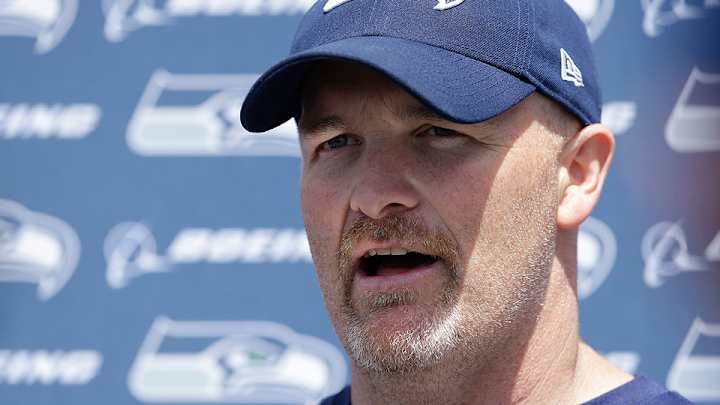The Next Great Coach

RENTON, Wa. — Here’s how championship teams are built.
Seahawks defensive coordinator Dan Quinn had been on the job less than two months when he got on the phone with Michael Bennett, then a free agent in Tampa Bay and a former Quinn pupil. It was March 2013, and the Seahawks had signed former Lions defensive end Cliff Avril less than a day before. With so many accomplished pass rushers on the Seattle roster, Bennett was skeptical. Quinn was emphatic.
“He convinced me he would use me to the best of my abilities,” Bennett says a year later, after inking a four-year contract extension. “I trusted that.”
Bennett signed on for one year, and Quinn delivered. He moved the 6-4, 274-pounder, undrafted in 2009, from end to tackle in nickel packages, and a year later the Seahawks rewarded his 8.5-sack season with a $28.5 million commitment.
“He’s not married to a scheme; he wants you to grow,” Bennett says of Quinn. “He changes with the players.”
Such is the hallmark of Quinn as a man and a coach—an open-mindedness that has vaulted the New Jersey native, at age 43, to the top of football’s unofficial power ranking of future head coaches. During what will likely be his last training camp as a coordinator, the brains behind football’s No. 1 defense sports a loose-fitting t-shirt, a weathered cap and a toothy grin.
In Quinn's first season as defensive coordinator, Seattle led the league in yards allowed and points allowed. (Ted S. Warren/AP)

“One of the things I’ve learned from Coach [Pete] Carroll is how to use our featured players,” Quinn says. “There’s a tendency to say, oh, he doesn’t fit the system. Coach Carroll is more like, what does he have that’s special?”
That means letting oversized safety Kam Chancellor set the edge in the run game and putting cornerback Richard Sherman in press situations on the line of scrimmage, and of course, matching up Bennett on occasion against lumbering offensive guards.
“All of those guys are so unique,” Quinn says. “You ask yourself, how can we feature them?”
Quinn, who played at Salisbury State in Maryland and got his coaching start at William & Mary, learned how to analyze players for latent strengths from the 49ers’ Bill McPherson in his first year in the league, as a quality control coach in 2001. He learned the 3-4 from Nick Saban in Miami, and he learned how to manage a coaching staff as a coordinator for two seasons at Florida under Will Muschamp from 2011-12.
Yet his defining trait isn’t so much learned as it’s a consequence of compulsion.
Says Bennett, “He’s a master in the film room.”
For Dan Quinn to become the Next Big Thing in coaching, his defense had to leave no doubt in Super Bowl XLVIII against Peyton Manning. In Quinn’s mind, that meant watching two years’ worth of Manning snaps in the week after the NFC Championship Game.
That’s every snap Manning had yet taken for the Denver Broncos, watched, re-watched and mentally catalogued; 1,479 throws, 967 handoffs, 131 touchdowns, 24 interceptions and more audibles than there are minutes in a day.
Says a close friend of Quinn’s, “He’s definitely an obsessive.”
I want to help Dan get whatever job he wants," Carroll says. “He’s going to be a head coach very soon.
While Quinn was studying, the Browns couldn’t wait. They’d interviewed him once following the regular season, and he planned to turn down a second interview request until after the playoffs. Before the Seahawks won it all, Cleveland inked Bills defensive coordinator Mike Pettine, who led a 20th-ranked defense which broke the franchise record for sacks (57) in a 6-10 season. The Vikings brought Quinn in as a finalist and passed in favor of longtime Bengals coordinator Mike Zimmer.
Pete Carroll was frustrated for Quinn, yet relieved for the Seahawks. Two years after watching Gus Bradley leave for the Jaguars’ head-coaching job, he would have a returning defensive coordinator for the title defense. Quinn, on the coaching fast track, hasn’t spent longer than two seasons in a city since 2004.
“It was a coup to get him back last year, much less this year,” Carroll says. “But I don’t want to look at it that way. I want to help Dan get whatever job he wants because he’s a great coach.
“Our situation in the season worked against him. We played so late that people had to make decisions. Teams get antsy, seeing coaches start to get hired and they couldn’t wait for him, but he’s going to be a head coach very soon.”
More 'Hawks
Robert Klemko visited Seahawks camp in Renton, Wash., to see how the Super Bowl champions are preparing for their title defense. FULL STORY
For the Seahawks, losing Quinn would likely mean the promotion of Rocky Seto, the defensive backs coach who had the peculiar title of Defensive Passing Game Coordinator added to his nameplate this offseason.
In that case, Quinn would leave behind one of the most talented defensive rosters in football—one largely assembled by Bradley in his four seasons in Seattle. Quinn’s recruitment and development of Bennett and Avril pushed them over the hump, but the evaluation of draft talent isn’t yet a strongpoint on the coach’s résumé. Ditto for offensive game-planning, for obvious reasons. His approach to the other side of the ball is likely to be influenced by the personnel already in place in a new city. He lists New Orleans among the offensive schemes he respects the most.
Any job he takes in a year, Quinn says, will rely on connections like the one he’s built with Bennett.
“It’s about being developmental,” Quinn says. “How much can you find out about this player? And what can you draw out of him? It takes a lot of time and effort. Those relationships are really important.”

